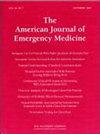Impact of on-hours versus off-hours admission on outcome in pediatric patients with testicular torsion
IF 2.7
3区 医学
Q1 EMERGENCY MEDICINE
引用次数: 0
Abstract
Objectives
Testicular torsion (TT) is an emergency requiring timely surgery to prevent testicular loss. There is a lack of reports on the clinical significance of the time of admission (on-hours vs. off-hours) on the long-term surgical outcome of TT.
Methods
We retrospectively reviewed all consecutive patients <18 years who were admitted to the hospital and treated for TT during the ten years. Patients were classified according to their admission time: weekday (on-hours), outside working hours, and weekends (off-hours). They were also classified based on their testicular outcome: salvaged and non-salvaged testis.
Results
Seventy-two patients were included. Their median age was 14.2 years. Thirty-three patients (46 %) were admitted during on-hours, whereas 39 patients (54 %) were admitted during off-hours. Forty-three patients (59.7 %) required orchidopexy and, out of those, during the long-term follow-up, only 27 (37.5 %) had definitive testicular salvage. Forty-five patients (62.5 %) were with no testicular salvage. On-hours vs. off-hours admission had no impact on the clinical outcome (p = 0.25). However, significant differences in the duration of symptoms (DoS) between the orchidopexy and orchidectomy groups were observed (p < 0.001).
Conclusion
Testicular torsion is a time-dependent diagnosis, and any delay in treatment could cause testicular loss. Our data suggest that the DoS before admission, rather than the admission time, influences the testicular outcome. The efficient management of emergencies regardless of the time of day is a key factor for the reduced probability that admission timing affects outcomes.
小儿睾丸扭转患者在上班时间和下班时间入院对治疗效果的影响。
目的:睾丸扭转(TT)是一种急症,需要及时手术以防止睾丸丢失。关于入院时间(上班时间与下班时间)对睾丸扭转长期手术效果的临床意义,目前还缺乏相关报道:我们对所有连续患者进行了回顾性分析:共纳入 72 例患者。他们的中位年龄为 14.2 岁。33名患者(46%)在上班时间入院,39名患者(54%)在下班时间入院。43名患者(59.7%)需要进行睾丸切除术,其中只有27名患者(37.5%)在长期随访中明确挽救了睾丸。45名患者(62.5%)没有挽救睾丸。上班时间与下班时间入院对临床结果没有影响(P = 0.25)。不过,睾丸切除术组和睾丸切除术组在症状持续时间(DoS)上存在明显差异(p 结论:睾丸扭转是一种慢性疾病,需要长期治疗:睾丸扭转的诊断与时间有关,任何治疗延误都可能导致睾丸缺失。我们的数据表明,入院前的DoS而非入院时间会影响睾丸的预后。无论在一天中的哪个时间段都能有效处理紧急情况,是降低入院时间对结果影响概率的关键因素。
本文章由计算机程序翻译,如有差异,请以英文原文为准。
求助全文
约1分钟内获得全文
求助全文
来源期刊
CiteScore
6.00
自引率
5.60%
发文量
730
审稿时长
42 days
期刊介绍:
A distinctive blend of practicality and scholarliness makes the American Journal of Emergency Medicine a key source for information on emergency medical care. Covering all activities concerned with emergency medicine, it is the journal to turn to for information to help increase the ability to understand, recognize and treat emergency conditions. Issues contain clinical articles, case reports, review articles, editorials, international notes, book reviews and more.

 求助内容:
求助内容: 应助结果提醒方式:
应助结果提醒方式:


